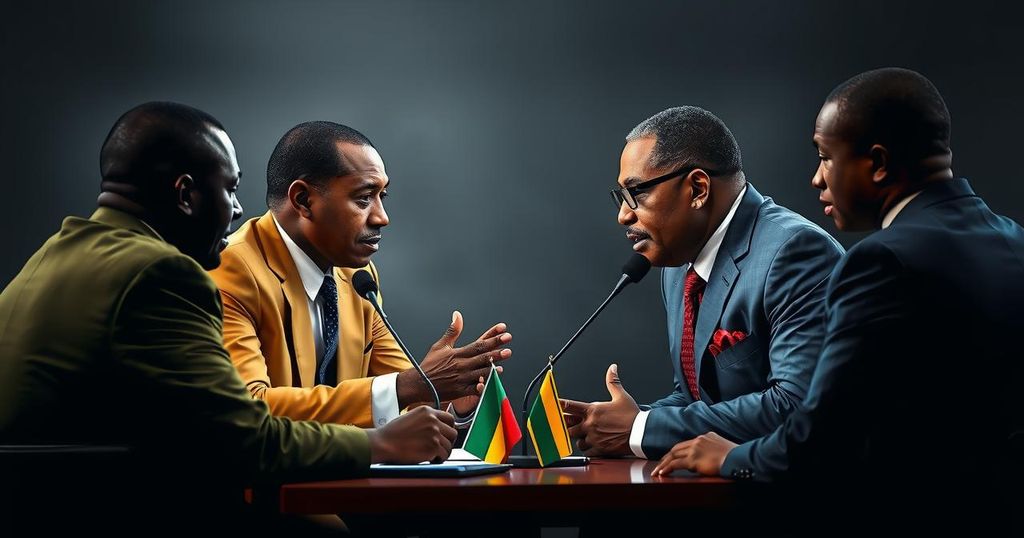Mozambique President Seeks Dialogue to Resolve Post-Election Unrest

Outgoing President Filipe Nyusi has invited candidates from the recent election to engage in dialogue aimed at resolving ongoing post-election unrest in Mozambique. The October elections have been marred by claims of electoral fraud and subsequent protests, leading to at least 30 reported deaths. The president emphasizes the necessity of unity to resolve pressing national issues, yet the response from opposition candidates has been muted amid skepticism regarding the sincerity of these overtures.
In a recent state of the nation address, outgoing Mozambican President Filipe Nyusi called for dialogue with the four presidential candidates in an attempt to quell ongoing unrest following the contentious elections held on October 9. The elections, which saw ruling party candidate Daniel Chapo declared the winner, have been criticized by protesters alleging that the results were manipulated. The unrest has resulted in multiple fatalities and injuries, prompting Nyusi to emphasize the detrimental effects of the protests on the nation’s economy and employment rates. Nyusi reiterated his commitment to restoring peace in Mozambique, urging all citizens to unite and collaborate to address the underlying issues affecting the country. He expressed hope that engaging in dialogue with the candidates could lead to constructive solutions beneficial to all citizens. Protests erupted after electoral officials announced Chapo’s victory with over 60% of the votes, a result that has been contested by independent candidate Venancio Mondlane, who received 20% and has called for nationwide demonstrations. The post-election turmoil has reportedly resulted in a death toll of at least 30 individuals, alongside a series of irregularities noted by international observers regarding the electoral process. In response to the aftermath of the protests, Mozambique’s Attorney General’s Office has initiated legal proceedings against Mondlane and his PODEMOS party for damages incurred during the disturbances. Human rights activist Adriano Nuvunga criticized this approach, suggesting that the president’s overtures towards dialogue appear insincere and fail to acknowledge the legitimate grievances of the protesters, who are awaiting the Constitutional Council’s validation of the election results. Mondlane, attributing the nation’s challenges to the historical ruling Frelimo party, condemned the prevailing poverty and increasing youth unemployment rates. In contrast, Methodist Bishop Dinis Matsolo advocated for dialogue as a means to facilitate national recovery, emphasizing the need for credible elections to ensure lasting peace. He stated, “What is happening now is the consequence of bad mismanagement of the electoral process, so it is very crucial that people should talk and put things right.” As of now, none of the candidates have publicly accepted President Nyusi’s invitation for talks, with Chapo’s inauguration scheduled for January. The political climate remains tense, as many citizens and political leaders insist on the necessity of genuine dialogue to address their concerns and foster a path towards stability.
The context of the unrest in Mozambique stems from the controversial elections held on October 9, wherein ruling party candidate Daniel Chapo was declared the victor amidst allegations of electoral fraud. This has sparked significant protests and unrest, resulting in deaths and injuries that have raised alarm regarding public safety and economic stability. The government’s response has included both an invitation for dialogue and legal action against dissenting candidates, reflecting a complex political environment fraught with challenges toward governance and public trust. The situation encapsulates broader concerns about the electoral process in Mozambique and its implications for democracy.
In conclusion, the call for dialogue by President Filipe Nyusi represents an essential but complex step toward addressing the ongoing unrest in Mozambique. The lack of acceptance from the opposition candidates highlights the deep rifts within the political landscape. As calls for credible elections and accountability grow, the pathway to lasting peace remains uncertain, necessitating earnest engagement among all political factions to foster reconciliation and stability in the nation.
Original Source: www.voanews.com







